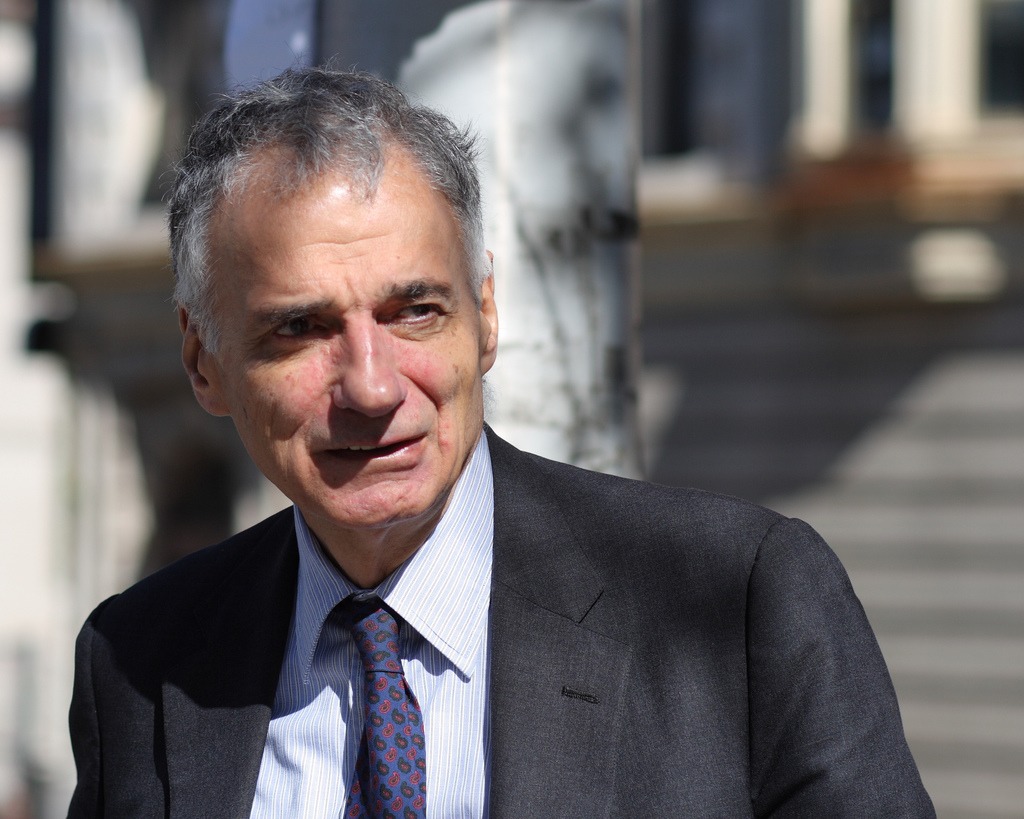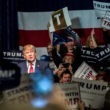Author Michael Payne interviewed Ralph Nader about Breaking Through Power and the future of the progressive movement. You can read that discussion here.
The end of the Bernie Sanders presidential campaign left many progressives wondering, “What now?” With the exception of a small minority of holdouts, most Sanders supporters went over to Hillary Clinton. One sentence in The Nation’s cautious endorsement of Clinton —“For progressives, a Clinton victory should be cause for organization, not celebration”—described the thinking of many Sanders supporters as they cast their votes for the former secretary of state.
Yet now, in the aftermath of Clinton’s defeat, the urgency is multiplied many times over, as progressives begin to imagine the challenge of standing up to the inevitable assaults of a Trump administration. And just as the attacks will come on many fronts, organizing on the left will need to take many forms. Some will fight to reclaim the Democratic Party, while others will do necessary work outside the party system.
Sanders himself encouraged his supporters toward the end of his campaign to “start engaging at the local and state level in an unprecedented way.” But what would engagement at the local and state level look like? And what concrete steps are needed to build a progressive movement outside the Democratic Party? The fact that many progressives’ political goals are contingent on building a movement independent of existing political parties makes it all the more remarkable that there’s been little discussion of how to build such a movement.
Ralph Nader—the longtime consumer advocate, progressive movement leader, and former Green Party presidential candidate—is starting that discussion. After the Sanders campaign’s electoral hopes faded in late April, Nader began unveiling his latest organizing push. The Breaking Through Power initiative, launched with the release of Nader’s new book and two separate conferences, is an attempt to jumpstart movement-building and provide an organizing roadmap for progressives in the aftermath of the Sanders campaign.
The most recent conference, billed by Nader as the “Super Bowl of civic engagement,” was held from September 26–29 in Washington, D.C. Nearly a hundred speakers were scheduled, including a few high-profile politicians like former Illinois Governor Pat Quinn and Michigan Congressman John Conyers. Most, however, were lesser-known civic leaders who don’t tend to make headlines.
That is the kind of organizing Breaking Through Power hopes to promote: easily diffused strategies and ideas for new institutions that would build real, lasting progressive political power.
The range of subjects presented over four days—the progressive uses of small-claims courts; the consequences of eliminating social studies from grade-school curricula; tactics citizens can use to influence shareholder meetings; tort law; the fiduciary duty of shareholders—might suggest a conference that lacked focus. Speakers from Public Citizen, Fairness and Accuracy in Reporting, the Center for Science in the Public Interest, and numerous other civic organizations told compelling stories about confronting and beating corporations. The unifying theme: all were describing the tools, tactics, and strategies necessary to build a progressive movement.
These speakers made it evident that civic organizations have achieved remarkable victories that have improved the lives of millions of Americans, yet the groups remain isolated and largely ignored by the media. One of Nader’s objectives is to overcome the balkanization of progressive political groups and unite them into a broad progressive movement.
Nader also believes that a successful movement will “have to incorporate a deep, pervasive, structural program to subordinate corporations to humans.” The Sanders campaign generated political energies, but it was a political campaign and didn’t provide a program for continued organizing after it ended.
One example of long-lasting institutional change was a “Penny Brigade” strategy discussed by Lloyd Constantine, an anti-trust lawyer and former senior adviser to Eliot Spitzer. The Penny Brigade can be used in instances where shareholders are majority owners of a corporation; it is meant to overcome the problem of shareholders lacking actual influence over the decisions of corporate management. To use the strategy, an organized bloc of shareholders would coordinate an initiative where they pledge one penny of each share they own to fund an independent watchdog organization focused on the interests of shareholders. As a result, shareholders could keep track of a corporation’s decisions and would have the information needed to hold management accountable. While the Penny Brigade has yet to be implemented, the initiative is part of a growing movement of shareholder activism. The larger goal, as Nader explained to the BBC, is “to raise an army of 500 people, one for each company in the S&P 500.”
That is the kind of organizing Breaking Through Power hopes to promote: easily diffused strategies and ideas for new institutions that would build real, lasting progressive political power.
Conference organizers have already announced their intention to create several new civic organizations. One is a “secretariat” of retired military, national security, and diplomatic leaders opposed to wars of aggression. The inspiration for the secretariat came from the lead-up to the Iraq War when numerous retired generals and presidential advisers spoke out against the war yet, because they largely acted alone, failed to get the attention of the media or Congress. Forming the secretariat would allow anti-war voices with military, diplomatic, and national security backgrounds to coordinate activities; they would also be provided with the resources necessary to get significant media attention.
“Voices,” another new organization, will promote citizen influence within the media. Though it’s rarely discussed, the airwaves are public property and commercial media are only allowed to use the airwaves if they are granted a license by the Federal Communications Commission. Voices would pressure the FCC into requiring that news outlets devote more time to public-interest programming as part of the FCC’s licensing process; the goal would be to put renewed emphasis on the 1934 Communications Act’s requirement that broadcast licensees operate in “the public interest, necessity, and convenience.” In addition, Voices would advocate for an “Audience Network”—a publicly-funded channel similar to C-SPAN that’s focused on civil society.
Nader’s most ambitious goal focuses on Congress. He argues that ending the dysfunctional gridlock of Congress will require building a progressive movement that employs full-time paid organizers in each congressional district. The organizers would lead issue campaigns focused on specific policies that a large majority of Americans already support—such as raising the minimum wage, getting money out of politics, ending corporate welfare, and strengthening Medicare and Social Security.
Organizers would create constituent groups in congressional districts that would allow citizens to spend a few hours each month monitoring the activities of their member of Congress. “Citizen Summons,” petitions, and press releases would be used to pressure members of Congress to attend town halls to meet with citizens working on issue campaigns.
The theory of change put forth at this conference is simple: mobilizing just 1 percent of the population around specific majoritarian policies is sufficient to change the behavior of members of Congress. If his congressional watchdog strategy were implemented, Nader argues, Congress’s legislative agenda would significantly change within four years.
The biggest obstacle is money. Nader estimated $100 million would be required to get the initiative off the ground, which ideally would come from a wealthy donor. Beyond large donors, the fundraising success of the Sanders campaign makes Nader optimistic about the possibilities of crowdsourcing.
The plan laid out at the conference bears a remarkable resemblance to the town-hall strategy the Koch brothers used to oppose the Affordable Care Act and mobilize the Tea Party movement. And Americans for Prosperity—the Kochs advocacy organization—has already invested millions of dollars in full-time paid organizers at the local and state levels. Nader’s plan is a progressive response to the Koch brothers’ network.
There is one critical component still missing: people.
Even during major speeches of well-known civic leaders and elected officials like Eleanor Holmes Norton, D.C.’s non-voting congressional delegate, the majority of the seats in Constitution Hall remained empty. While the conference was broadcast by the Real News Network, most media ignored it. And representatives of critically important organizations that could help advance the change Nader is advocating—U.S. PIRG, labor unions, People for the American Way—didn’t show up.
Nader describes apathy as the major challenge confronting a progressive movement. Yet he remains optimistic. The book, the conference, the new organizations—all of those are a way of “planting a lot of seeds and hoping some farmers will cultivate them. ‘Here it is folks; use it in your own circle and your own neighborhood and your own movement.’”
As the conference wound down, the empty seats almost seemed to energize Nader. “That’s the way every justice movement starts,” he told the small crowd. “It always starts with a lot of empty seats. It always starts with people who want someone else to go first.”
During Nader’s closing remarks—on a day that had been focused on mobilizing citizens in defense of U.S. tort law—he grew visibly upset as he described how citizens’ power to challenge corporations in the courts had been drastically diminished.
“We’re destroying in all kinds of ways the rule of law, subordinating it to the rule of raw corporate power and turning the government into a corporate state. . . . This is our heritage, our freedom to participate in power!” Of Constitution Hall’s 3,702 seats, roughly 30 remained filled.
“If we are to have a democracy, as Judge Learned Hand said, we must not ration justice.”
With that, the conference was over. Nader walked off stage while the remaining attendees gave a standing ovation.
Michael Payne is an activist and writer living in Virginia. To read Payne’s interview with Nader, click here.







Thanks Ralph sorry I missed out
Thank you for staying the course in fighting for justice